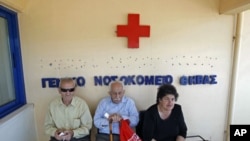Doctors in Greece are warning of an impending health catastrophe brought about by the financial crisis. They say government cuts mean patients are unable to afford treatment, while hospitals are facing staff cutbacks and shrinking budgets for medicines. A study in the medical journal Lancet echoes the warnings, and says there are signs of a sharp rise in mental health problems and suicides.
The emergency ward at Evangelismos Hospital in Athens - Greece’s largest - and the flow of patients is relentless.
Doctors say government spending cuts and rising unemployment are stretching services to breaking point.
Ilias Sioras, head of the doctors’ association at the hospital, said, “People cannot afford private doctors, therefore the numbers resorting to public hospitals has risen, by approximately 25 to 30 percent. This has been verified by the [Health] Ministry. Poor people have no money to pay for their healthcare and consequently come here. Then the volume of work grows on all levels. In the emergency wards, in the laboratories, the surgeries and in the clinics. Secondly, in Evangelismos hospital there is shortage in the nursing personnel.”
Tens of thousands of Greeks are losing their jobs and their private health insurance. The Health Ministry has started charging patients for more drugs - and many patients cannot even afford the $7 flat fee when visiting a clinic.
Sioras said there are further worries about the quality of supplies.
"The hospital authorities have negotiated with the medical companies and they’ve bought copies of the original medicines. These are of doubtful quality and especially with antibiotics, we have witnessed the appearance of many allergies among patients.”
Outside Evangelismos, there was concern among patients over the cuts to healthcare.
One man said, “We are not satisfied, things are not going well, the hospitals are not going well. In Greece, if you don’t have money you die.”
Another blames the number of immigrants. “With the economic crisis - because of a cost-cutting - some things have been cut short,” he said, “but I think the biggest problem still is the 2 million illegal refugees who receive free hospital care.”
Workers at the Evangelismos Hospital suggest there has been a 10-fold rise in HIV cases among intravenous drug users. They blame cutbacks to government initiatives, like the syringe exchange program.
A report in the medical journal Lancet warns of a rise in suicides. Alexander Kentikelenis of Britain’s Cambridge University is one of the authors.
"We have been able to find reports by the minister of health and other officials quoting a 25 percent rise in suicides in 2010, and a 40 percent rise in suicides in the first half of 2011," said Kentikelenis.
The government denies there’s a health crisis. The director of Evangelismos hospital says the changes would benefit the system - calling it ‘restructuring.’
And some patients, like Antonios Sideris, still praise their treatment.
“I have cancer,” he said. I don’t have a financial issue because in my case, everything is free, the hospital and my medication. I don’t have to pay anything. I am satisfied with my care.”
But many doctors fear that level of care cannot be maintained.
Cardiologist Sioras, said, “That’s why we say that the situation in the hospitals will become tragic, and if we don’t take measures against that and have no working solidarity, we will be mourning victims every day.”
Doctors like Sioras say that every day on the hospital wards, they are witnessing the human tragedies of Greece’s economic meltdown.
Greek Doctors Warn of ‘Health Catastrophe’




